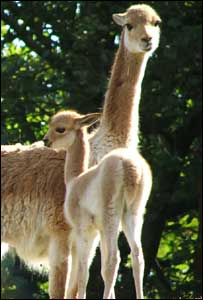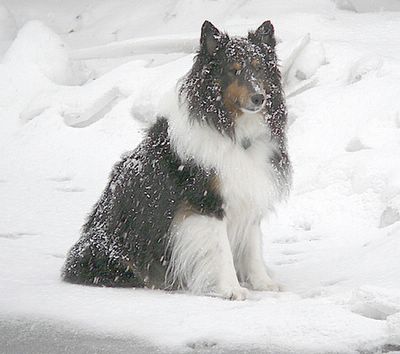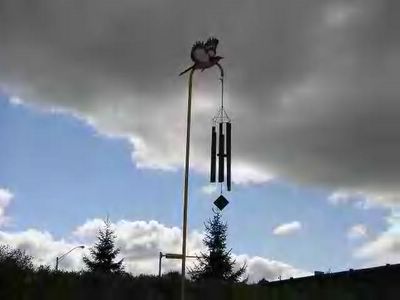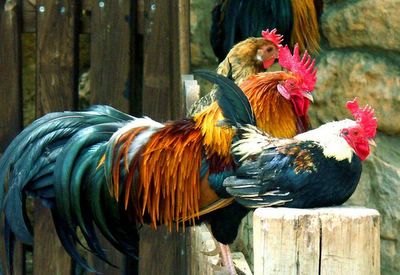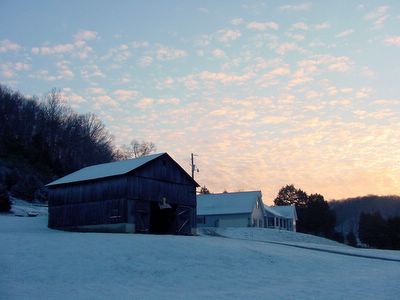Zoos
New zoo chief takes can-do approach
Janis: Ross Park needs new, expanded exhibits, master plan
BINGHAMTON — When Mike Janis looks at the Binghamton Zoo at Ross Park, he sees a facility that needs to improve and has gotten "a bad rap" over the past couple of years.
But the new executive director also sees a facility with a good staff, the potential to grow and a 130-year history in the community.
"It's a diamond in the rough that just needs some polishing," Janis, 58, said Tuesday. "It needs work, but with community support it's doable."
Tuesday was the second day on the job for Janis, who was hired by the Southern Zoological Society board in early December. A proven director with 26 years in the zoo field, Janis comes to the struggling Ross Park facility after 10 1/2 years as director of the Lake Superior Zoo in Duluth, Minn.
"We expect good things from Mike Janis," said Harry Jacobson, president of the zoological society that operates the Ross Park facility. "He brings experience with animals, zoos in general and managing people."
http://www.pressconnects.com/apps/pbcs.dll/article?AID=/20060104/NEWS01/601040312/1001
Oregon Zoo Achieves Second Best Attendance In Its 119-Year History
PORTLAND, Oregon - Popular camps, summer concerts and special events boosted the Oregon Zoo's calendar year attendance to 1,339,537, its second highest attendance in 119 years. Last year the zoo achieved an all time high of 1,350,952 visitors during its calendar year. Zoo Director Tony Vecchio is pleased by the community support.
http://www.medfordnews.com/articles/index.cfm?artOID=326809&cp=10997
Zoo curator predicts Bears will lick Panthers
January 11, 2006 - So far, the Bears have beaten up on the Lions, the Falcons, the Panthers and other teams with animal nicknames. They have to battle the Panthers again this Sunday for a berth in the NFC Championship game. Frank Mathie wondered what would happen if a real panther had to fight a real bear. He went to the Lincoln Park Zoo for some answers.
http://abclocal.go.com/wls/story?section=local&id=3802946
Welfare tag for ethical farm produce
16.01.06
BRUSSELS - European consumers who prefer meat and dairy products from humanely treated animals may soon be able to buy farm produce stamped with an EU "welfare" label.
Noting a "seismic shift" in consumer opinion towards promoting animal welfare rather than merely preventing avoidable suffering and cruelty, the European Commission says it is keen to see more products get by using high welfare standards.
One way to achieve this, it said in a five-year plan to improve treatment of animals, would be to create a label to help consumers choose between "minimum" and "higher" welfare standards for the meat, milk or eggs that they wanted to buy.
"The establishment of an EU label for animal welfare is an option to be explored in the near future which could promote products elaborated under high welfare standards," it said.
http://www.nzherald.co.nz/section/story.cfm?c_id=2&objectid=10363812
Shark nets ineffective says expert
16.01.06
By Tara Ravens
SYDNEY - For decades, swimmers at many city beaches have felt confident in the knowledge that a mesh net separated them from the predators of the sea. But those nets may be little more than a placebo, says fish expert John Paxton.
Dr Paxton, an Australian Museum icthyologist, says the idea that meshing keeps man-eaters away from surfing beaches is an illusion.
A shark net failed to save 21-year-old Sarah Whiley when she was fatally mauled on Queensland's North Stradbroke Island earlier this month.
Up to three bull sharks tore off both Sarah's arms and severely lacerated her torso and legs when they attacked her as she waded in shallow water at the netted beach.
http://www.nzherald.co.nz/section/story.cfm?c_id=2&objectid=10363810
This is a huge mistake to start. Reintroduced species also bring entire change in ecosystem, including viruses and bacteria as well as keystone predator species.
US scientists plan to reintroduce wildlife missing for 13,000 years
14.01.06
By Peter Huck
Later this year, several giant Bolson tortoises will be taken from a facility in Arizona to the 63,000ha Ladder Ranch in New Mexico. If the tortoise adapts to its new home it will be the first step in a controversial "re-wilding" project to create a vast "ecological history park" filled with creatures from the Late Pleistocene era on the Great Plains of North America.
The tortoise, extinct in the United States for 8000 years, lives in Mexico's Chihuahua Desert. The plan has turned the world of conservation biology upside down and if successful it could have profound implications for global conservation.
In 1805, when explorers Meriwether Lewis and William Clark made their epic journey through the American West, the prairies teemed with large animals, from buffalo that trampled their campsite, to elk, wolves, mountain lions and grizzly bears.
Yet fossil records show this was merely the rump of a much greater megafauna (large vertebrates) population, which included lions, mammoths, mastodons, cheetahs, horses and camels that had vanished many millennia before humans arrived.
But what if these animals, still found elsewhere with the exception of the proboscidians (elephant), returned to the Americas?
Several scientists, writing in Nature, have proposed just that. Instead of using 1492, when Columbus arrived, as a restoration benchmark, Re-wilding North America advocated pushing the clock back 13,000 years to create "an alternative vision of 21st-century conservation biology".
Its authors say that the gradual release of large vertebrates, as proxies for Pleistocene species, into the US southwest and the Great Plains, would revitalise threatened ecosystems and boost depressed economies. Given threats to megafauna elsewhere, its supporters believe "re-wilding of American sites carries global conservation implications".
Echoes of the Pleistocene, which ended 10,000 years ago, still linger in the US. Pronghorn antelopes can run up to 112km/h, far faster than predators. "Almost everything about pronghorn biology screams cheetah," says Josh Donlan, an evolutionary biologist who co-authored the Nature paper.
"That's the result of cheetahs preying on American grasslands for 4 million years." In a re-wilded range cheetahs will chase, kill and eat pronghorns. "That's what being a cheetah is all about. People would probably pay money to see it."
The public reaction to this bold idea was immediate and not always complimentary. "Re-wilding the plains is a bit too wild," cautioned the Kansas City Star, musing about the quality of fence needed to separate people from, say, lions and elephants, the last of the proboscidians.
As for the economic benefits that re-wilding might bestow on the Great Plains - increasingly depopulated and littered by ghost towns - the Chicago Tribune recalled a 1989 Buffalo Commons proposal by academics Frank and Deborah Popper. The Poppers felt bison herds would resuscitate the Prairies as a tourist-friendly US Serengeti. This provoked an outcry from inhabitants more used to "taming" nature.
The decade-old Yellowstone wolf restoration project, which has created a wild wolf population numbering some 900, still needs federal protection from vengeful locals.
Responses to the Nature idea echoed the outcry against the wolves and the Poppers. "I received more than 1000 emails," says Donlan. "more than half hated the idea."
Time may be on Donlan's side. Raising buffalo is a growth industry out West, and thousands roam ranches and Indian land.
Scientists were also divided. Some feared re-wilding North America would drain money - and animals - from African projects. Others blasted the plan as junk science.
"Essentially, you'd be running it like a zoo," Eric Dinerstein, the World Wildlife Fund's top scientist told National Geographic. "Why not just encourage Disney to run a theme park?"
"It is clear this idea rattled the cage of the scientific community and stirred the public," says Donlan. He envisages a softly, softly campaign of extensive research guided by the fossil record.
It is unsure, for example, how Pleistocene proxies would handle America's climate extremes. Mitochondria DNA shows that the American "cheetah", Miracinonyx trumani, evolved separately from its African namesake. Reintroduced species from captive stock would be released on fenced private land long before lions or elephants.
Given Washington's anti-environmental tone, initial support will come from sources such as the Turner Endangered Species Fund, which is funding the Bolson tortoise project, re-wilding's pilot scheme.
"If this works everyone will catch the Bolson tortoise bug and there will be restoration sites all over the Southwest," says Mike Phillips, executive director at the species fund, which is being bankrolled by media tycoon and conservationist Ted Turner.
Meddling in nature is inherently risky, but re-wilding is arguably no more so than the ecological consequences of wiping out Pleistocene megafauna. Evidence suggests top-down predators maintain the diversity of ecosystems and wildlife.
Wolves were reintroduced to Yellowstone to cull ungulates (hoofed mammals) and preserve species further down the food chain.
To critics who accuse re-wilders of playing God, Donlan admits, "there's a clear potential for unforeseen consequences".
He says disease is a worry but, in a process expected to last a century, he isn't too concerned about hybridisation or invasive species.
"It's hard to imagine a runaway population of giant tortoises, let alone a runaway population of lions."
A more detailed proposal will appear this year. Re-wilders want to explore how megafauna shaped eco-systems and promoted species diversity. "We want to restore what we know were important ecological processes in America," says Donlan.
Wolves now roam the French Alps. In Scotland, a businessman wants to stock his estate with wolves, bears, bison and lynx. And in the Pacific there is talk of releasing flightless rails.
"Could rails play a similar ecological role in New Zealand ecosystems to that played by moas 500 years ago?" asks Donlan.
Russian scientist Sergey Zimov has been exploring re-wilding on his 160sq/km Pleistocene Park project at Yakutia in Siberia since 1989. Reindeer, moose, musk oxen and horses are recreating "the ancient mammoth ecosystem". Zimov also wants bison and Siberian tigers.
Changing tundra to steppe may also stall the huge discharge of carbon from melting permafrost that threatens to accelerate global warming.
"It's a shoestring operation," says Terry Chaplin, professor of ecology at the University of Alaska. "There's no major funding. Zimov goes at his own pace. He's currently putting in new fence posts."
Zimov's project raises an issue that divides scientists: were the great Pleistocene extinctions caused by warming weather or by humans? Zimov plumps for the latter, noting that die-offs in America (70 per cent of large animals) and Australia (23 animal species) coincided with the advent of hunters, who used spears and arrows.
This view is shared by Paul Martin, doyen of re-wilders, in Twilight of the Mammoth.
Martin says stealth re-wilding has already begun, as peccaries (New World pigs) spread across the southwest; mustangs elsewhere.
"It's an unplanned resurrection, which nobody is complaining about, and which resurrects fauna that was native here before the extinction 13,000 years ago."
Ultimately, re-wilding offers a back-to-the-future, proactive vision. Traditional conservation, says Donlan, only slows relentless biodiversity loss by "managing extinction". Pristine habitats have vanished.
In a doom-and-gloom world, with nature in retreat and climate change advancing, Pleistocene parks offer hope for endangered species.
Big ideas are needed urgently to counter the planet's sixth mass extinction, the biggest species holocaust since the Pleistocene.
"As a species we're probably largely responsible for this event," says Chaplin. "Do we sit back and try to slow extinction? Or do we try to restore some of the diversity that has been lost?"
http://www.nzherald.co.nz/search/story.cfm?storyid=000D0665-3E65-13C7-BBF483027AF1FE9F
Moscow Circus uses vodka to keep elephants warm
The Moscow Circus has resorted to vodka -- plenty of it -- to keep two Indian elephants warm while they perform in chilly Mongolia.
As the circus prepared for a week-long program in Mongolia's capital Ulan Bator, they faced an awkward problem -- how to keep the two tropical animals happy in one of the world's coldest environments. They found a very Russian solution.
"When the elephants arrived, we gave them three liters of vodka each to keep warm," a Mongolian organizer said.
The mercury in Mongolia regularly falls to minus 30 degrees Celsius (minus 22 degrees Fahrenheit) or lower during the winter months.
Last time the Moscow Circus was in Ulan Bator was over 25 years ago, when Russia was still the center of the mighty Soviet Union, and Mongolia was its obedient satellite, according to the Ulan Bator Post.
The elephants, transported by truck from Russia, have posed major logistical problems for the organizers, the paper said.
Mongolia's State Circus, which provides the venue for the twice-daily shows, did not have a pen big enough for the elephants, and instead its horse pens had to be altered into make-shift elephant accommodation.
The elephants also have to be fed 50 kilograms of vegetables, 30 kilograms of fruit and 20 kilograms of bread and honey every day, running up a giant food bill footed by Mongol Gazar Savings and Loan.
http://www.chinadaily.com.cn/english/doc/2006-01/17/content_512935.htm
Public pet burials spark health concern
(Xinhua)
Updated: 2005-12-07 09:29
Cats and dogs are lucky to live with urban Chinese families, where they are fed milk and bathed with shampoo. But, sadly, most of them do not end up with a decent, or even proper, burial after death, which has aroused wide concern about public health.
Once despised as a sign of bourgeois decadence in the nation several decades ago, pets have been popular with Chinese urban dwellers over the past few years, due to a dizzying rise in their living standards accompanied by a growing sense of loneliness.
However, how to deal with dead pets has become an increasingly acute problem in China. It is worthy of note that most of them in Chinese cities are buried in the lawns of residential quarters, public parks, and some are even thrown in the garbage or tossed into local rivers, said Lu Di, head of China's Association of Pets Protection.
The government has so far no laws or regulations concerning the burial or cremation of dead pets, Lu said.
In Jinan, a medium-sized city in the eastern Shandong Province,over 18,000 pets die from diseases or old-age every year.
"But almost all are buried casually," said Lin Zhenguo, president of the Zhenmu Pets Hospital in Jinan.
Sitting in his office, Lin pointed to the Qianfo Shan (ThousandBuddha Mountain) resort across the street, saying that some pet owners had just sneaked in the park and buried their dead pets in the dark.
"Animal bodies carry many germs, some of which won't die out even when the bodies decompose in the earth," Lin said, adding that casually disposed bodies could pollute the underground water,on which nearly half of Jinan's 2 million residents depend.
"The best way to handle bodies is cremation or deep burial," Lin said.
All over the country, only a couple of cities like Beijing, Shanghai, and Chengdu have animal crematoriums, but few of them make good business.
A worker at Bo'ai Animal Crematorium, the only such institute in Beijing, said they cremate only a dozen dead pets monthly in the city that has an estimated 2 million pets, over 300 of which die every day.
Business has been slow since the animal crematorium started, said the owner, who asked not to be identified.
"It is hopeless to try to recover our over 3 million yuan (371,300 US dollars) investment," he added.
To cremate a dog costs 500 yuan (61 US dollars), or 800 yuan ifit is big, he said, adding that a casket for the ashes costs 100 yuan to 1,300 yuan.
In recent years, businessmen have cashed in on the animal cemetery business, targeting wealthy pet owners, only to find themselves called-off by the government or in a dry market.
Most pets are treated well only when they are alive.
Lin said sometimes he has to keep and bury dead pets abandoned at the hospital.
"If no action is taken, five years later when most pet dogs aregrowing into their final years, China will face a severe problem of a pet necropolis," he warned.
In China, the animal hygiene issue first came to the spotlight in 2003, when civet cats, considered a delicacy in the southern province of Guangdong, were linked with the deadly SARS outbreak.
At present, the fight against bird flu has required chicken and duck raisers to vaccinate their poultry. Pet bird markets in Shanghai have been suspended.
Earlier this month, a source with the central government said it was drafting laws to protect animals, a subject that is closely connected to food safety and public health.
Experts have suggested the government fund pet crematoriums and burial sites affordable to common pet owners.
"I have no problem spending 200 yuan to have my dog cremated orburied properly," said Liu, a native of Jinan who took his sick dog to Lin's hospital.
http://www.chinadaily.com.cn/english/doc/2005-12/07/content_501260.htm
Monument to homeless dog
MOSCOW. (RIA Novosti commentator Anatoly Korolyov.) The Moscow Metro will soon have a monument to a dog. The finished sculpture was recently displayed in the art shop of Alexander Tsigal. Right now the dog is made of clay, but by the New Year it will be cast in bronze and put up in the hall of the Mendeleyevskaya Station.
This story took place two years ago. A stray dog called Malchik (Boy) lived underground inside the Mendeleyevskaya Station for about three years. He was of good character, and the Metro employees used to feed him. There are many stray dogs roaming the city streets now, abandoned by their owners because of economic hardships. (The Moscow budget for 2006 has set aside 74 million rubles ($2.58 million) to "regulate the upkeep of animals," or simply, to neuter them.) Today, it is almost a luxury to keep a dog.
To continue the story, Malchik had a stroke of bad luck. One day, a fashion model, Yuliana R., was out with her Staffordshire terrier of impeccable breed. She noticed Malchik and started setting her dog against him. In effect, it was a parody of social conflict.
http://en.rian.ru/analysis/20051219/42550927.html
Dogs kill rare animal at city zoo
Stray dogs have killed a vicuna, the smallest member of the camel family, at Belfast zoo.
Four dogs gained access to the vicuna paddock at the north Belfast zoo on Wednesday and attacked two of the animals before staff could intervene.
One of the animals, Emma, died as a result of the attack and a six-month old calf sustained severe injuries to his abdomen.
Three of the dogs were captured by zoo staff, but the fourth escaped.
http://news.bbc.co.uk/1/hi/northern_ireland/4628912.stm
Roadside Zoo achieves crowd-pleasing balance of jam, funk
By ROD LOCKWOODBLADE STAFF WRITER
There are funk bands that jam, with the George Clinton-led Parliament/Funkadelic crew at the top of that list. The band’s long, live instrumental interludes have always been built on the funkiest of grooves.
And there are jam bands that bring the funk. moe is probably at the top of that list, launching into loose, funked-up improvisational races in concert that bear little resemblance to some of its more traditional jam-band recordings.
Then there’s Ann Arbor’s Roadside Zoo, a four-piece band that does both: jams and gets down, striking a balance between going off on musical tangents that make the musicians happy while still keeping the audience interested.
“All of the kids who are into jam bands don’t think we jam enough,” said bassist Chris Ramos in a phone interview. “The kids who aren’t into jam bands, but like to dance, think we jam too much.”
http://toledoblade.com/apps/pbcs.dll/article?AID=/20060119/ART10/60119069/-1/ART
Koalas continue to drop off in American zoo
20jan06
ANOTHER Queensland koala has developed a fatal illness in an American zoo and is likely to die within weeks.
The male koala has been diagnosed with cancer, and experts at South Carolina's Riverbanks Zoo, in Columbia, have decided not to use chemotherapy.
In 2003 Queensland sent the zoo the first two koalas to travel to the US for more than a decade. The animals were subsequently joined by koalas bred in other countries, including Japan.
http://www.thecouriermail.news.com.au/common/story_page/0,5936,17874372%5E954,00.html
Cub orphaned by train destined for zoo
CALGARY, Alberta, Jan. 19 (UPI) -- An orphaned grizzly bear cub whose mother was killed by a train in the Canadian Rockies cannot be returned to the wild.
Instead, Mistaya, now in the Calgary Zoo, will be going to a zoo in British Columbia. Her companion, Koda, is destined for the Kicking Horse Grizzly Bear Refuge in Golden, British Columbia, the Calgary Sun reports.
"My goal is to find the best and most appropriate place for these bear cubs to live out their days," said British Columbia Environment Minister Barry Penner, adding that there are at least three suitable homes for her in the province.
Mistaya's mother died in August in Banff. The mother was named Bear 66, a sign of wild living that unfortunately did not provide protection from civilization.
http://www.upi.com/NewsTrack/view.php?StoryID=20060119-111048-6681r
New Spokeskids For Seneca Park Zoo
1/19/2006 6:00 PM
(WROC-TV)
The Seneca Park Zoo has a lot of new helpers.
Six spokeskids were chosen Thursday afternoon to be the ambassadors of the zoo's Bucks For The Baby campaign.
140 kids tried out for the job to raise awareness about the new baby elephant due as early as next month. Six were chosen as finalists, but the committee couldn't pick just one, so all are getting the gig.
These spokekids will be making appearances at various community events and drumming up support for the campaign.
http://www.wroctv.com/news/story.asp?id=21410&r=l
Zoos, parks need to be prepared if bird flu comes
Web-posted Jan 19, 2006
By BOB GROSS
Of The Oakland Press
From the mundane and common to the exotic and endangered, captive birds of all kinds would literally be sitting ducks if there were an outbreak of avian influenza in Oakland County.
Both the Detroit Zoo in Royal Oak and the Farm Learning Center at Kensington Metropark in Milford Township have contingency plans should the deadly H5N1 strain - ravaging poultry and causing human deaths in Asia - make it here.
While there's debate about avian influenza jumping to North America, Ann Duncan, chief veterinarian at the Detroit Zoo, said, "Regardless of whether it's inevitable, we have to be prepared.
"Zoos have a very large responsibility to protect the birds in our care. We're always proactive when it comes to diseases like this."
http://www.theoaklandpress.com/stories/011906/loc_2006011902.shtml
Houston Zoo's lion euthanized due to kidney failure
Bruno was a fixture at the zoo since 1989
By SALATHEIA BRYANT
Copyright 2006 Houston Chroncile
Bruno, whose deep-throated roar could be heard throughout the grounds of the Houston Zoo, and sometimes as far away as nearby Ben Taub Hospital, was euthanized by local zoo officials Tuesday.
Zoo officials said the African lion was in severe kidney failure with no other treatment options available.
Bruno had been at the Houston Zoo since 1989. Over the weekend, the animal showed signs of deteriorating health. He lacked an appetite and winced as in pain.
"Bruno was an icon," said Hollie Colahan, curator of primates and carnivores. "He's very popular with a lot of people."
Colahan said the zoo will likely get another male lion.
The zoo has two female lionesses — Lindi and Celesto.
http://www.chron.com/disp/story.mpl/metropolitan/3595925.html
Pandas at Thailand zoo mate for first time in two years
First posted 00:06am (Mla time) Jan 19, 2006
Associated Press
BANGKOK, Thailand -- At first, it was a purely platonic relationship. But after two years in the same enclosure, giant pandas Chuang Chuang and Lin Hui have started mating, raising hopes they could give birth to a baby in the coming months.
The pandas started the mating dance Sunday with a mock wrestling bout, according to officials at the Chiang Mai Zoo in northern Thailand. From there, the pair began sniffing one another on Tuesday and mated later in the day.
"The pandas are very happy. For the last two days, they have made love together," said Rossukhon Chuicomwong, head of public relations for the Chiang Mai Zoo. "We are so happy because maybe we'll have a baby panda soon."
http://news.inq7.net/world/index.php?index=1&story_id=63378
Hamster, snake best friends at Tokyo zoo
‘I’ve never seen anything like it,’ zookeeper says of unlikely pairing
TOKYO - Gohan and Aochan make strange bedfellows: one's a 3.5-inch dwarf hamster; the other is a yard-long rat snake.
Zookeepers at Tokyo's Mutsugoro Okoku zoo presented the hamster — whose name is a tasty rice dish in Japanese — to Aochan as a snack in October, after the snake refused to eat frozen mice.
But instead of indulging, Aochan decided to make friends with the furry rodent, according to keeper Kazuya Yamamoto. The pair have shared a cage since.
http://msnbc.msn.com/id/10903211/
Zoo set to sell off 12 acres for new homes
BRIAN FERGUSON CITY COUNCIL REPORTER
EDINBURGH Zoo is planning to sell off a massive chunk of its land for housing to help fund a £58 million redevelopment of the attraction.
Zoo chiefs have earmarked 12 acres of land on its site in Corstorphine as surplus to requirements in the hope of ploughing the expected £15m proceeds from a sale into its plan for the site.
Up to 100 new homes will be built on a huge swathe of zoo property to the west of its 90-acre site under the plans.
The Royal Zoological Society of Scotland, which runs the attraction, has struck a deal in principle with EDI, the development firm set up by the city council.
Although the land, off Corstorphine Road, lies on green belt in the west of the city, council officials have given their backing to the proposed sell-off because they are seen as a crucial part of the zoo's blueprint for the future.
Zoo chiefs today warned that the attraction may have to quit its Corstorphine home if the sell-off plans fail.
David Windmill, chief executive of the zoo, said: "We've been in lengthy discussions with the city council in relation to our masterplan, as the sell-off of some land is vital to help fund the developments we are planning here.
http://news.scotsman.com/scotland.cfm?id=97242006
Zoo's pony ring to close
Woodland Park Zoo's pony population is aging, and the zoo has decided to close its pony ring for the coming spring and summer — unless the zoo can find an outside contractor to operate the ring using its own ponies.
The zoo has decided not to have its own operation until a new pony facility can be built. Youngsters, however, can still get up close to farm animals at the zoo's family farm, which includes miniature horses.
The pony ring and pony rides at the zoo have been a tradition for generations of zoo visitors, dating to 1919. But over the past couple of years, age has taken a toll on the zoo's dwindling herd. Rides were limited last season to avoid overworking the animals, which are now being farmed out to private owners.
http://seattletimes.nwsource.com/html/localnews/2002744290_here17m.html
Woodland Park Zoo ponies at trail's end
Age, garage project rein in longtime tradition
By KERY MURAKAMISEATTLE POST-INTELLIGENCER REPORTER
Their legs hurt, their joints ache and who could blame 'em?
K.C. and Patches are in their mid- to late 20s. Given that most ponies live only into their 30s, they'd like to kick back and start enjoying their golden years. They'd move to Florida if they could. They're definitely ready to put their days of lugging excited tots around the pony ring at Woodland Park Zoo behind them.
http://seattlepi.nwsource.com/local/255718_ponies14.html
County: We won't pressure zoo boss
Tuesday, January 17, 2006
By Mark Weiner
Staff writer
Onondaga County officials said Monday they will not stand in the way of Rosamond Gifford Zoo Director Anne Baker if she chooses to leave the post she has held since 1993.
"The last thing we want to see is for her to leave Syracuse," said county Parks Commissioner Robert Geraci. "But we would never hold anyone back. Anne is a fantastic director, and we're lucky to have her."
Geraci said the county has not tried to influence Baker, who is one of two finalists to become director of the larger Toledo Zoo in Ohio, regarded by some as one of the top zoos in the nation.
"I told Anne, 'Do what you think is professionally right for you, and we'll be behind you.' I don't want to pressure her in any way," Geraci said Monday.
The Toledo Zoo is expected to decide as early as Thursday on a new director. That person will receive about $200,000 in salary and benefits.
The other finalist is Don Moore, a former curator at the Rosamond Gifford Zoo at Burnet Park. Moore is now director of the Wildlife Conservation Society at Prospect Park Zoo in Brooklyn.
Geraci said he did not know yet if the county could make Baker a counteroffer to stay in her civil service position, which pays about $75,000 per year.
Baker has been criticized by animal rights activists for the zoo's handling of a 4-day-old elephant who died in August after falling into the deep end of a swimming pool.
The Toledo Zoo's former executive director, William Denn- ler, resigned in May amid similar animal welfare complaints after 24 years at his position.
Dennler had been criticized for the handling of several animals that died at the zoo, according to The Toledo Blade newspaper. Among them was a sloth bear that died in 2000 after being placed in a den without food or water.
http://www.syracuse.com/news/poststandard/index.ssf?/base/news-2/113749088886520.xml&coll=1
Jackson's 'cruel' zoo
By Daily Mail
16 January 2006
Michael Jackson has been accused of animal cruelty at his all-but abandoned Neverland ranch.
Animal rights activists have demanded an urgent probe into conditions at the sprawling estate.
They claim giraffes, elephants and other creatures are imprisoned in squalid and cramped surroundings.
Shocking photographs appear to reveal animals surrounded by their own faeces.
A giraffe seems to be standing in a pool of its own blood while a crocodile swims in a pool little wider than itself.
Elephants appear to be walking among their own excrement, with no sign of keepers.
A spokesman for animal rights' group PETA - People for the Ethical Treatment of Animals - called on Jackson to close down the zoo immediately.
http://www.thisislondon.co.uk/showbiz/articles/21436823?source=Daily%20Mail
PETA Yells At Michael Jackson's Zoo Of Cruelty
Filed in in MusicThere was a time when a story about Michael Jackson would have been about a music video co-starring The Simpsons or the way that Michael somehow turned into a car during Moonwalker.
Now, though, Michael Jackson only ever gets into the news by doing things wrong. The latest thing that Jackson has got into trouble for is alleged animal cruelty to the creatures in his Neverland zoo. The good news is that PETA is on the case, and the extra good news is that is a PETA story that doesn't include the name Heather Mills McCartney. For once.
http://www.hecklerspray.com/hecklerspray/2006/01/peta_yell_at_mi.html
Detroit Zoo considers a tax
By Christy Strawser
Daily Tribune Staff Writer
PUBLISHED: January 18, 2006
Park must explore other options following loss of Detroit's financial support
ROYAL OAK — School bonds, road proposals, city millages — residents faced them all this year — and now the Detroit Zoo may try to add another tax to the mix.
Zoo officials talked to Oakland County about adding a .125 mill to tax rolls to support zoo operations. It would cost the owner of a $200,000 house about $12.50 a year.
"You've got to explore every opportunity and it's one that has to be looked at by the zoological society," said Ralph Richard, executive officer of Oakland County's Parks and Recreation Department. "If they're willing to go to bat for it..."
Many said even a small tax could be hard to pitch in Michigan's tough economy, where unemployment has been the nation's highest, and, as reported Tuesday, the average house price in Oakland County was $10,000 less in 2005 than 2004.
Zoo leaders haven't decided if, or when, to put a proposal on the ballot, but some are urging for a vote by this fall.
Officials describe need for zoo taxes
Review board hears arguments for levies
Erika Blake and JENNI LAIDMANToledo Zoo officials told citizens’ tax review committee again yesterday that animal exhibits would be closed and staff laid off if voters do not support proposed levies in May.
And, in a separate meeting, the zoo board of directors said it would select a new executive director within two weeks.
Although the nine-member Lucas county tax Levy Review Committee said it is convinced the zoo needs tax funds to continue operating, it hesitated to give blanket support of the levies. Instead, members asked tough issues such as diversity and accountability during a more than two-hour meeting.
The zoo hopes to ask voters for a 0.85-mill, five-year operating levy and a 1-mill, 10-year capital levy.
http://www.dailytribune.com/stories/011806/loc_zootax18001.shtml
Bear in Ukraine Zoo Bites off Boy’s Hands
Created: 16.01.2006 12:51 MSK (GMT +3), Updated: 12:51 MSK
MosNews
A brown bear in a Ukrainian zoo has bitten off both hands of a 12-year-old boy who entered his open-air cage and tried to treat the animal to crackers, Ukrainian News reported.
Two boys and a girl from a nearby village came to see the animals at the zoo in the town of Mena, north-central Ukraine. When they reached the bear’s cage one of the boys jumped over a fence and approached the animal, offering him some food, but the animal attacked him.
With his hands bitten off to the elbows and in a state of shock the boy was rushed to hospital. His condition has been described as stable but grave.
http://www.mosnews.com/news/2006/01/16/bearhands.shtml
Bear bites off child’s arms in Ukraine zoo
(AFP)
16 January 2006
KIEV — A bear in a Ukraine zoo has bitten off the arms of a 12-year-old child who ended up in its cage, Interfax reported yesterday citing the emergency ministry.
The child, whose sex was not specified, had both arms bitten off to the elbows and has been hospitalised in serious condition, the agency said.
The incident occurred on Saturday in a zoo in Mena, a northern Ukrainian town.
http://www.khaleejtimes.com/DisplayArticle.asp?xfile=data/theworld/2006/January/theworld_January354.xml§ion=theworld&col=
Zoo tries to rebuild grounds, finances
Questions persist about extent of subsidy
JONATHAN ELLIS
jonellis@argusleader.com
Article Published: 01/15/06, 2:55 am
Elizabeth Whealy, the new president and CEO of the Great Plains Zoo, walked away from a meeting with the Sioux Falls City Council earlier this month with the biggest funding increase in the zoo's history.
The $500,000 bump brings the zoo's total city subsidy for the coming year to more than $1.3 million. That money, tagged for day-to-day operations and coupled with more than $1.9 million already approved for physical improvements, means the zoo is drawing more city funds this year than any other public attraction in Sioux Falls, including the Washington Pavilion of Arts and Science.
Whealy said the zoo needs the extra money for languishing maintenance projects and to pay raises for employees, a staff characterized by her and others as woefully underpaid.
http://www.argusleader.com/apps/pbcs.dll/article?AID=/20060115/NEWS/601150347/1001/COLUMNISTS
Zoos to provide more details to elephant import hearing
A hearing into whether eight Thai elephants will be allowed into Melbourne and Sydney zoos will continue today.
In December, the Administrative Appeals Tribunal approved the importation of the elephants from Thailand on the condition the zoos satisfy questions raised about the conditions the elephants will be kept in.
Animal welfare groups unsuccessfully opposed the importation of the animals for the zoos' conservation program.
A spokeswoman for Sydney's Taronga Zoo says both zoos will provide information to the tribunal today on how the animals will be looked after.
She says she is hopeful permission will be granted to import the elephants that are currently being kept in quarantine centre in Thailand.
http://www.abc.net.au/news/newsitems/200601/s1548722.htm
Cincinnati Zoo lags in humane elephant care
Your voice: Les Schobert
The Cincinnati Zoo's approach toward elephants is about as outdated as its elephant building, which was built in 1906 ("Elephant exhibit poses care issues," Jan. 2). The zoo ignores the wealth of scientific knowledge gained about elephant behavior and biology over the past several decades that should guide the care of elephants in captivity today.
Field studies show that elephants are highly intelligent and complex individuals who live in tightly knit extended family groups, with mothers and daughters staying together for life. We have discovered that elephants have a highly developed social structure approaching the complexity of humans.
Wild elephants' lives are rich. Important events like matings and the coming of the rains are celebrated. Their dead are mourned. During a day, an elephant can walk 30 miles or more in a natural range that covers hundreds of square miles. The wanderings are not solely to find food but also to explore their environment, socialize and maintain their health.
http://news.enquirer.com/apps/pbcs.dll/article?AID=/20060115/EDIT02/601150310/1021/EDIT
Director discounts chances of bird flu reaching Scovill Zoo
DECATUR - Mike Borders is optimistic about the animals at Scovill Zoo not catching the bird flu that has been running rampant in Asia and parts of Europe.
That's one reason why Borders, the zoo's director, didn't think it necessary to attend a conference this past week in Chicago.
Federal government officials, zoo officials and representatives from the American Zoo and Aquarium Association met at Lincoln Park Zoo to discuss ways of detecting early signs of the bird flu before it hits the United States.
"We're pretty proactive when it comes to the animals," Borders said. "And from what I've been reading, the bird flu among the chickens in Asia was because the chickens were living in close proximity to people - that is where the problem comes in."
http://www.herald-review.com/articles/2006/01/15/news/local_news/1012449.txt
Study: Panda pair would be asset to Oakland Zoo
Exhibit could bring up to 1.3 million more visitors during the next 10 years
By Laura Casey, STAFF WRITER
OAKLAND — A pair of giant pandas at the Oakland Zoo could bring up to 1.3 million more visitors to the facility during 10 years and increase the visits of out-of-town tourists and members of the Asian community, an Oakland Zoo market study released this week said.
The study, developed by the Hausrath Economics Group, said if a pair of giant pandas comes to Oakland, the zoo can expect a spike in attendance within the first few years and another spike should the pair have a baby.
"A giant panda would be a valuable addition to the Oakland Zoo and could make the zoo a regional attraction," the study said. "It would be expected to result in a substantial increase in zoo attendance, particularly in the ini-tial years."
It also would attract more Asian visitors, the study said. Currently, Asian residents are less likely than other Bay Area citizens to visit the zoo.
http://www.insidebayarea.com/trivalleyherald/localnews/ci_3402301
Celebrity backs campaign to save wild elephants
Monday, 16 January 2006, 4:19 pm
Press Release: Australian Green Party
Star backs campaign to save wild elephants
Actor Jessica Napier today joined Greens MP Lee Rhiannon in calling on the NSW government to turn its $40 million rainforest enclosure at Taronga Zoo into a home for retired circus elephants rather than bring wild elephants from Thailand.
Ms Napier, who has starred in The Alice and McLeod's Daughters, said, "Taronga Zoo should use its newly built rainforest elephant enclosure to house Australia's old circus elephants.
"If Thai elephants are imported they will be taken out of their natural habitat and will have to be cruelly domesticated before they arrive in Australia," Ms Napier said.
Last year Greens MP Lee Rhiannon and representatives of animal welfare groups released video footage showing how Thai wild elephants are domesticated using extreme cruelty.
"Zoos can only accept domesticated elephants. To make baby elephants obedient they are put into cages for two to three days with their legs tied together. The baby elephants are then beaten with sticks around their legs and picks are stabbed into the extremely sensitive areas around their ears and head, Ms Rhiannon said.
"Community opposition has been growing to the importation of Thai elephants.
"After first planning to reintroduce elephant rides Taronga management later argued the elephants were needed for its breeding program.
"I believe the elephant importation plan is about increasing the number of visitors to Taronga and boosting revenue.
"The Greens strongly support elephant breeding programs but these are best conducted in their natural habitat.
"We have not been able to find any cases where zoo bred elephants are returned to the wild. The few baby elephants born in zoos are given to other zoos.
"Taronga management have admitted that no elephants bred in captivity will be returned to the wild.
"Minister Bob Debus is responsible for Taronga Zoo. I have called on him to back the Greens campaign for the $40 million rainforest enclosure to be used as a retirement home for circus elephants.
"This is a win-win for the government - they get elephants at Taronga and can assist the breeding of elephants in their native habitat," Ms Rhiannon said.
http://www.scoop.co.nz/stories/WO0601/S00168.htm
From farms to zoo, Turkey reels from bird flu
Workers cover cages at Ankara's zoo as Turkish poultry industry complains of huge losses.
By Kadyr Toktogulov
ASSOCIATED PRESS
Sunday, January 15, 2006
ANKARA, Turkey — From the capital's main zoo to a reeling national poultry industry, the effects of a deadly bird flu outbreak continued to ripple across Turkey on Saturday.
Authorities nationwide continued to slaughter thousands of chickens, turkeys and geese as a precaution against the H5N1 strain, which has killed at least 79 people worldwide, including three Turks.
http://www.statesman.com/news/content/news/stories/world/01/15birdflu.html
Killer twins worked at local zoo
EVIL twins, facing life behind bars for robbing and killing their step-grandmother, were working at Paradise Wildlife Park in Broxbourne just a few months before the wicked crime.
But even then, brothers Robert and Jonathan Maskell, 18, together with their friend and accomplice Dwane Johnston, 19, showed their utter disdain for the law by speeding off in one of the park's company vans while they were supposed to be working.
The Maskell twins and Johnston were convicted at the Old Bailey of the manslaughter of frail Angelica Hallwood.
Five months before committing their brutal attack on the 74-year-old widow at her home in Edmonton, north London, all three of them were working at the park in White Stubbs Lane.
http://www.hertsessexnews.co.uk/news/mercury/hoddesdon_mercury/2006/01/13/killer%20twins%20worked%20at%20local%20zoo.lpf
Taipei Zoo urges government not to play panda politics
By Mo Yan-chih
STAFF REPORTER
Saturday, Jan 14, 2006,Page 2
Reacting to the government's reluctance to accept China's offer of two pandas, the Taipei City Zoo and its advocates yesterday urged the government not to play "hide-and-seek" with the pandas or ignore the wishes of Taipei residents to receive them.
They said that if the government insisted on politicizing the panda offer and meddling in the issue, they will invite Taipei residents to sign a petition asking the government to listen to the people's voice.
"The Council of Agriculture promised to make a final decision by seeking professional opinions, and we expect them to keep their promise," said the Taipei City council deputy speaker Lee Hsin of the People First Party (PFP) at a press conference.
http://www.taipeitimes.com/News/taiwan/archives/2006/01/14/2003288936
Zoos are the First Line of Defense Against Bird Flu
Jan. 13, 2006 - Peoria
Jessica Wheeler
Local zoos have become the first line of defense when it comes to protecting us from the bird flu.
At Peoria's Glen Oak Zoo they check their birds daily for symptoms associated with that and other diseases.
They have also been given guidelines from The American Zoo and Aquarium Association to prevent the spread of any diseases.
Zoo Manager, Yvonne Strode said, "With the birds we don't use the tools we use with the birds any where else. We disinfect their cages. Any toys we give them we'll disinfect in between the two."
Strode says as the bird flu gets closer to the United States they will step up their checks of all birds in order to detect if its in the country.
http://www.hoinews.com/news/headlines/2198357.html
Patna Zoo turns a cozy home for animals in bitter winter
By Ajay Kumar, Patna: With no signs of let-up in the bitter cold sweeping across north and eastern India, the Patna Zoo has made special arrangements to keep its animals warm.
Since last week, there has been a sudden dip in temperatures in the plains due to heavy snowfall in Jammu and Kashmir and Himachal Pradesh.
Animals' enclosures have been provided with straw mats and electric heaters to keep them warm.
Lions and tigers relished the straw mats and room heaters while reptiles warmed up under high-voltage bulbs.
“The cold has intensified in the last seven days. We have made arrangements for all the animals. We are providing heaters to the tigers and lions, especially during the night hours. We are also using bulbs of 500 to 1000 watts for the snakes,” said Subhash Verma, the Deputy Director of the zoo.
The cold spell, which has been accompanied by heavy fog, has closed schools and caused widespread disruption to transport as well as sending thousands of homeless to huddle around public bonfires.
The Sanjay Gandhi Botanical and Zoological Garden of Patna is one of the largest enclosure of flora and fauna in India.
The Garden is open throughout the year. During the New Year's Day, and other holidays, the park is generally packed with people living in Patna as well as tourists from neighboring towns. Picnic and cookouts are all around with people dressed in colorful clothes to celebrate the occasion.
Adjacent to the Garden is Patna's famous 18-hole golf course, said to be one of the finest golf courses in Bihar.
The zoo receives between 15,000 to 20,000 visitors during the peak season.
http://www.newkerala.com/news.php?action=fullnews&id=84827
Denver Zoo Video LinkVery cute, endearing with a stark reality about 'Big Cat Mothers.'
In a rare phenomenon, a baby lion rejected by her mother has been adopted by another Denver Zoo lioness and is thriving under her care, with some help from handlers.
http://cfapp.rockymountainnews.com/video/popup-w.cfm?VID=lions2
Denver Zoo lioness adopts girl cub
By Rocky Mountain News
January 12, 2006
In a rare phenomenon, a baby lion rejected by her mother has been adopted by another Denver Zoo lioness and is thriving under her care, with some help from handlers.
The baby named Asali, was born to a lioness named Baby on Nov. 23. The first three weeks, all went well with first-time mother and cub, but suddenly Baby lost interest in nursing her baby girl.
Zoo staff intervened and brought the cub back to health. They also continued exposing the cub to other lionesses to keep her socialized. One lioness in particular, Natal, paid close attention to Asali. Natal had only recently given birth to stillborn cubs. Soon Natal had adopted Asali.
"Natal has proven to be a nurturing mother. We're so pleased that she is willing to raise this cub as her own. To our knowledge this is one of the first successful introductions of a surrogate lioness and cub in North American zoos," said vice president for biological programs Lynn Kramer.
Asali and Natal are not yet on exhibit. Asali, now 7 weeks old and 13 pounds, continues to be fed by zookeepers.
http://www.rockymountainnews.com/drmn/local/article/0,1299,DRMN_15_4384280,00.html
Raccoons force zoo to close restaurant
Associated Press
ASHEBORO, N.C. - Raccoon isn't on the menu at the Junction Restaurant at the North Carolina Zoo, but several have shown up in the restaurant, and that means the doors will be closed for a while.
Officials say the restaurant staff discovered that raccoons had been in the ceiling of the building, but not in the food preparation or eating areas. It's believed the animals gained access through a ventilation duct.
Due to the possibility that bacteria or other health problems might be carried by the animals, the zoo has closed the restaurant until the raccoons are gone.
Zoo chief of staff Mary Joan Pugh says the restaurant will remain closed until all the raccoons can be trapped. The raccoons will then be held until a decision can be made on their relocation.
During that period, the staff will seal off all possible accesses to the restaurant to prevent such an incident from recurring.
Two other restaurants at the zoo will remain open.
http://www.charlotte.com/mld/observer/news/local/13609276.htm
Lion tamer suggests zoo at fault
13 January 2006
By KAREN HODGE
A circus owner who has brushed with death working with lions claims sloppy procedures may have led to a Wellington Zoo keeper's mauling.
The claims are rejected by zoo management who say it is offensive to compare zoo training to that used for circus animals.
Whirling Bros circus owner Tony Ratcliffe has survived close brushes with lions and fought for his life once during a 40-year career as a zoo keeper and circus owner.
He believes something went wrong for Wellington Zoo keeper Bob Bennett to be mauled by two 120-kilogram African lions as he fed them on Tuesday. Mr Bennett underwent surgery the following evening and was in a comfortable condition in Wellington Hospital last night.
http://www.stuff.co.nz/stuff/0,2106,3538439a11,00.html
Six Flags bad for elephants, says group
Park dismises claims as 'anti-zoo propaganda'
By Lachlan MacLean/Times-Herald, Vallejo
Tika, a 5-ton African elephant, walks at Six Flags Marine World with elephant trainers Patrick Chapple and Jennifer Dickey. (Brad Zweerink/Reporter file)
An international animal rights group has included Six Flags Marine World in its "Ten Worst Zoos for Elephants" list for the second year in a row.
Elephants at the theme park in Vallejo are subject to poor treatment that may negatively affect their health and livelihood, said Suzanne Roy, program director for the nonprofit animal advocacy group In Defense of Animals, in its announcement this week.
Marine World spokesman Paul Garcia dismissed the list and the group's accusations as "anti-zoo propaganda full of misleading claims."
http://www.thereporter.com/news/ci_3395406
Interesting Idea.
Museum, zoo honors day with free admission
January 12, 2006
INDIANAPOLIS -- The Children's Museum of Indianapolis, 3000 N. Meridian St., will offer free admission 10 a.m.-5 p.m. Monday in honor of Martin Luther King Jr. Day. The day will include special entertainment and guests.
The Indianapolis Zoo and White River Gardens, 1200 W. Washington St., will offer free admission Monday to guests who bring a canned-food item for Gleaners Food Bank.
The other five ticketed attractions in White River State Park will also offer free admission and free parking to guests who bring a canned or nonperishable food item for Gleaners. Each person in a family or group is asked to bring a food item to donate. The other attractions include Indiana State Museum, IMAX Theater, Eiteljorg Museum, NCAA Hall of Champions and Indianapolis Indians.
http://www.topics.com/articles/5/063948-1915-088.html
Zoo to Create Elephant Conservation Center
By SEAN D. HAMILL , 01.11.2006, 04:16 AM
As zoos across the nation debate whether to keep elephants in captivity, the Pittsburgh zoo is buying a former hunting ranch to house a new conservation center to breed African elephants.
The 700-acre center could later include cheetahs, black rhinoceros, and Grevy's zebras, but the biggest slice of the former Glen Savage Ranch would be dedicated to pachyderms.
The project "is extremely important to the zoo and to the conservation efforts of elephants nationally and internationally," said Gary Claus, chairman of the Pittsburgh Zoo & PPG Aquarium's board of directors.
http://www.forbes.com/technology/feeds/ap/2006/01/11/ap2442639.html
Zoos could serve key role in bird flu fight
file:home3
January 10, 2006
BY MICHAEL TARM ASSOCIATED PRESS
The nation's zoos could play a central role in halting the spread of avian flu to humans by watching for an outbreak of the potentially deadly disease among captive birds, public health and zoo officials meeting in Chicago said Tuesday.
The virus is typically transmitted bird-to-bird, making more than 200 zoos ideally positioned to detect and then track the disease, said Dominic Travis, a Lincoln Park Zoo epidemiologist.
"The fact that susceptible animals sit in areas that we watch for health problems all the time anyway gives you a good probability of being able to identify something," Travis said. "We have these sentinels (zoos) in the middle of large populations that can potentially contribute information to the public health infrastructure."
http://www.suntimes.com/output/news/zoo10.html
Oregon Zoo leopard battles fast-spreading cancer
02:56 PM PST on Wednesday, January 4, 2006
By ANTONIA GIEDWOYN, kgw.com Staff
The Oregon Zoo's female Amur leopard, Andrea, has been diagnosed with cancer which has already spread so far that the big cat has no shot at survival, zoo officials sadly conceded on Tuesday.
The Oregon Zoo's female Amur leopard, Andrea, has been diagnosed with cancer which has already spread so far that the big cat has no shot at survival, zoo officials sadly conceded on Tuesday.
"Big cats are so popular, not only with our visitors, but with our staff and volunteers as well, that everyone gets extremely attached," said Oregon Zoo Director Tony Vecchio. "Her loss will be felt not just here locally, but world-wide due to the critically endangered status of this species."
An ultrasound last month revealed a uterine tumor in the 14-year-old, according to the zoo's lead veterinarian, Dr. Mitch Finnegan. The tumor has grown on all the surfaces in the leopard's abdomen, including her liver and spleen.
The leopard also has ovarian cancer involving one ovary. Surgery was performed on her, but there were already too many cancerous cells polluting the cat's body.
"Unfortunately, in Andrea's case, effective treatment is not available," Finnegan said. "We are treating her to keep her comfortable and as pain-free as possible. Our plan is to control her discomfort as well as we can and to euthanize her when we can no longer maintain her quality of life."
Wild animals instinctively mask symptoms of sickness to avoid appearing weak and therefore vulnerable, according to Finnegan. Unfortunately, often by the time illness is discovered, the disease has already advanced.
Despite the cancer, Andrea appears active. She could be seen playing with a toy and climbing high on Wednesday.
Andrea's keepers noticed her mild lethargy and slightly decreased appetite in mid-November, according to Finnegan.
The leopard and her brother, Frederick, arrived at Oregon Zoo in April of 2000 from Colorado Springs Zoo.
The lifespan of an Amur leopard in captivity is normally 19 years. Native to eastern Russia, they are considered highly endangered with only about 60 to 100 left in the wild.
Also known as the Manchurian or Korean leopard, the species has slowly drifted from its original Korean habitat to China and finally to eastern Russia, where zoologists say it is making a last stand. Its habitat is the mountainous area along the Amur River valley of Siberia where habitat destruction and loss of prey species has heavily reduced the leopard population.
http://www.kgw.com/news-local/stories/kgw_010406_animals_leopard_cancer_.44d5c659.html
Zoo To Add Five New Positions
The Great Plains Zoo is making some major changes in 2006. As we told you last night, Zoo President Elizabeth Whealy released her budget for the upcoming year, which included pay raises for employees and money for repairs.
The City Council doesn't have to vote on the zoo's budget because $1.6 million was already set aside for Zoo operations last summer, when it was unclear who would manage the facility.
Tuesday, the City Council extended the partnership between the City and Zoological Society to manage the Zoo as a team. And since it's asking the City for less than what was originally set aside, changes at the zoo are ready to move forward.
In 2006, the Great Plains Zoo's total operating budget will be about $2.7 million dollars. That's close to $700,000 more than last year. Zoo President Elizabeth Whealy says the increase is necessary to get the Zoo back in shape.
$1.2 million dollars of that budget will be used to pay employee salaries. The Zoo is adding five new positions this year, including a veterinary technician, two animal keepers, a development director and an educational outreach person. Part of that money will also be used to increase current salaries up to industry standards, and fill four open staff positions.
The largest increase in the budget over last year will pay for maintenance on zoo buildings and exhibits that was postponed during previous years. $145,000 is set aside to pay for those repairs, tools and facility supplies. That's a 62 percent increase over last year's costs. And $48,000 is set aside for repair of museum exhibits and new equipment, a 45 percent increase over last year.
While the zoo's budget continues to grow, city and zoo officials say the increase is needed to catch up from past neglect, and set the stage for future expansion.
http://www.keloland.com/News/NewsDetail5440.cfm?Id=0,44995
Dusit Zoo to become Bangkok's night safari
BANGKOK, Jan 4 (TNA) - Dusit Zoo will soon become Bangkok's night safari, thanks to an initiative of the Zoological Park Organization Under the Royal Patronage of His Majesty the King to extend the zoo's opening hours until evening.
Dusit Zoo's officials told journalists here Wednesday that facilities were being arranged, including modifying of areas and preparing for special tram services to serve the public for their animal tours at night.
The works were expected to be completed soon--in time for the zoo to welcome children, the general public and tourists during the forthcoming Chinese New Year in late January, said the officials.
"Once the new project is launched, members of the general public and tourists are welcome at Dusit Zoo from day to night time," they added.
The extended opening hours of the Dusit Zoo will be later announced to the public.
Thailand's first night safari is Chiang Mai Night Safari in the North, which has opened for the public for more than 30 days during its test run.
The country's first night safari will be officially opened by February, according to government officials. (TNA)--E002
http://etna.mcot.net/query.php?nid=5647
concluding …



